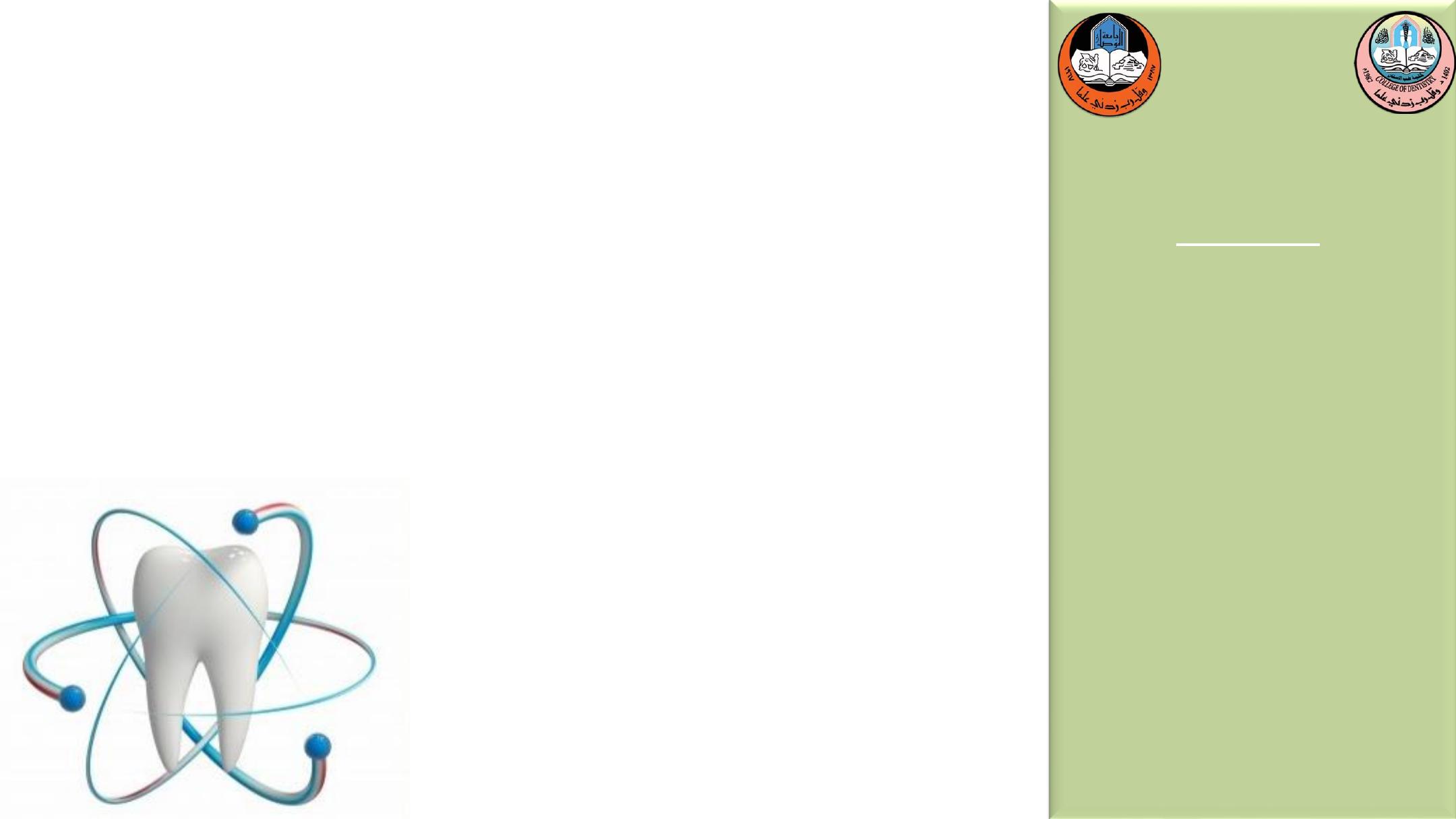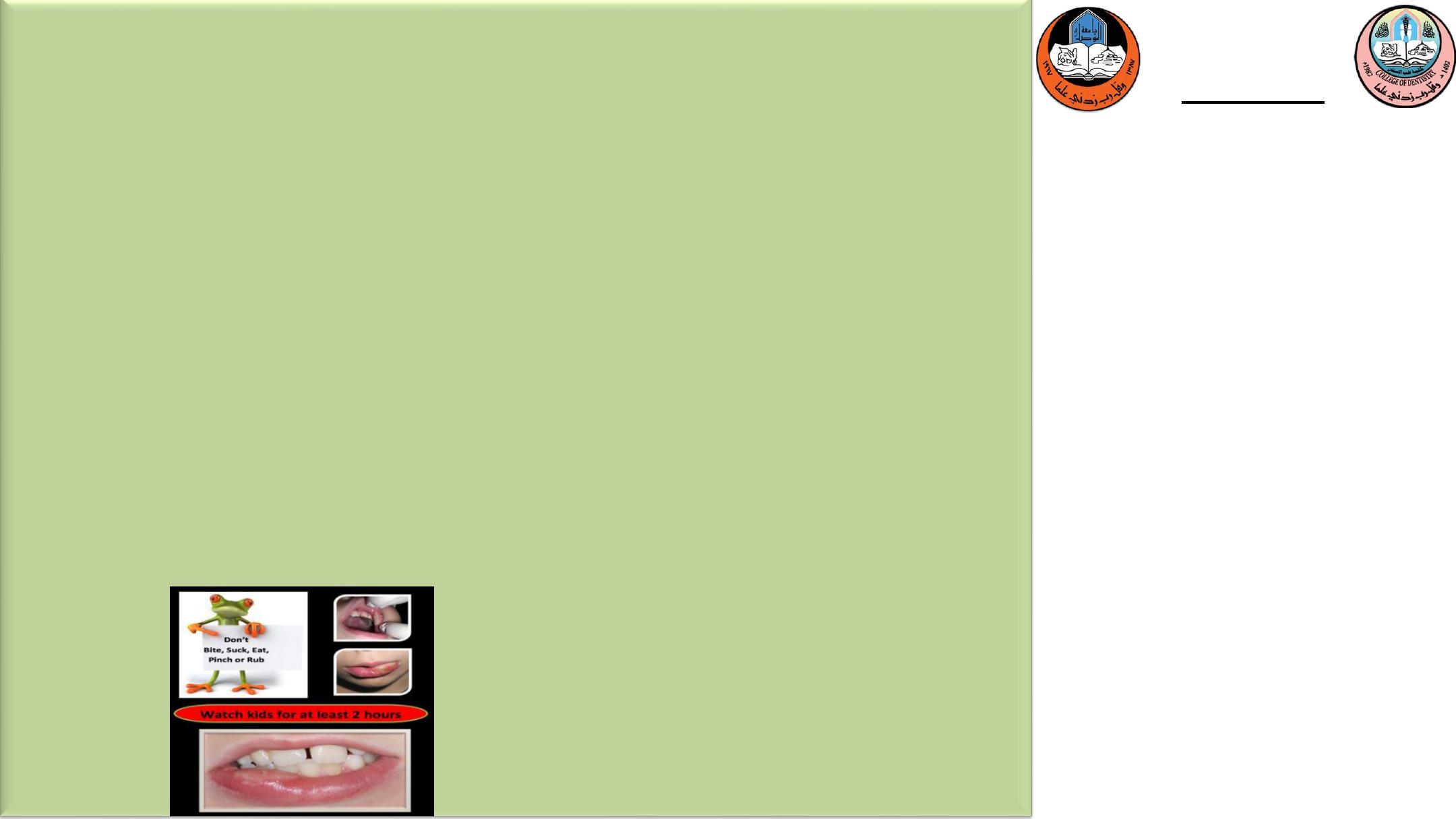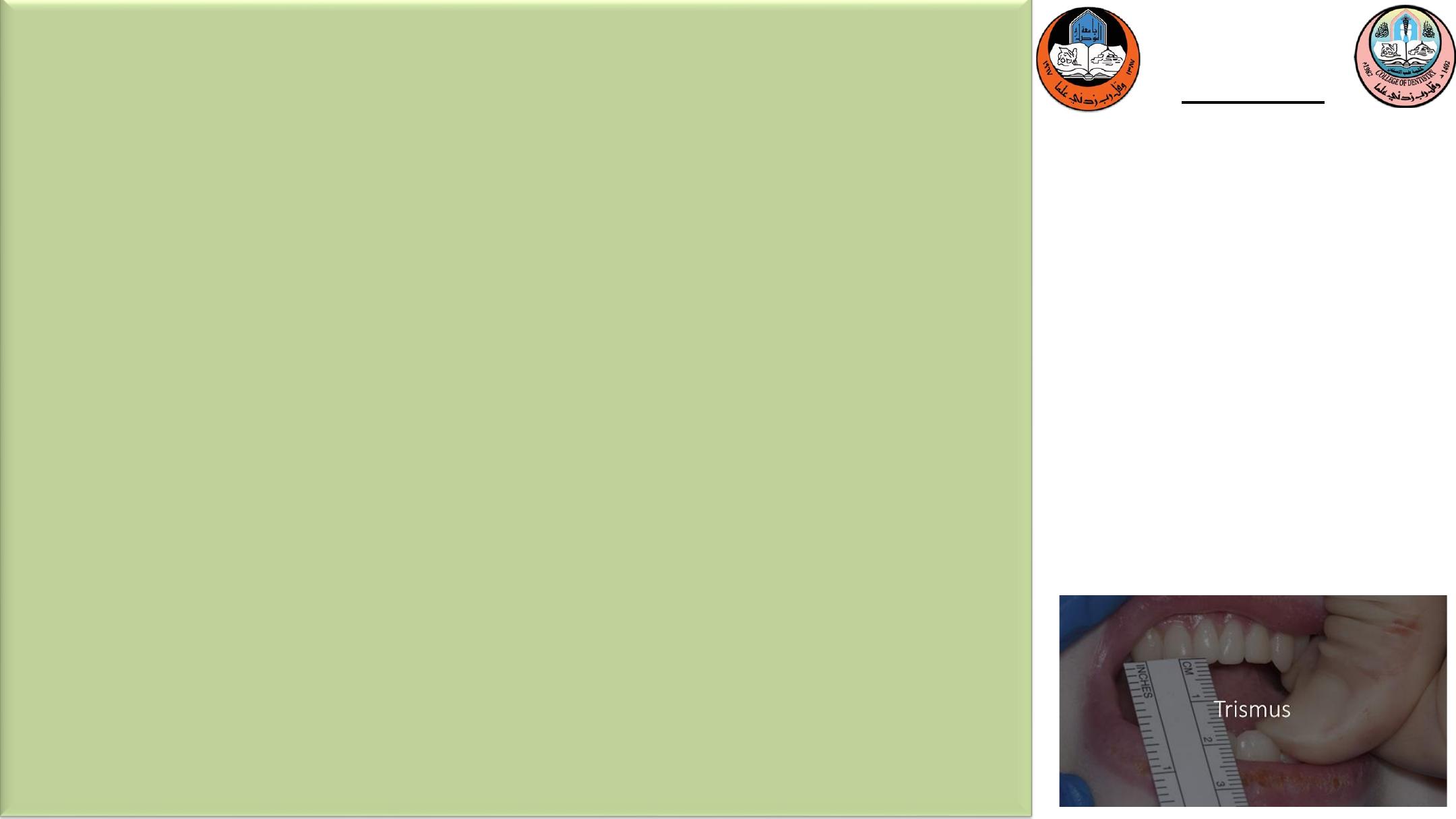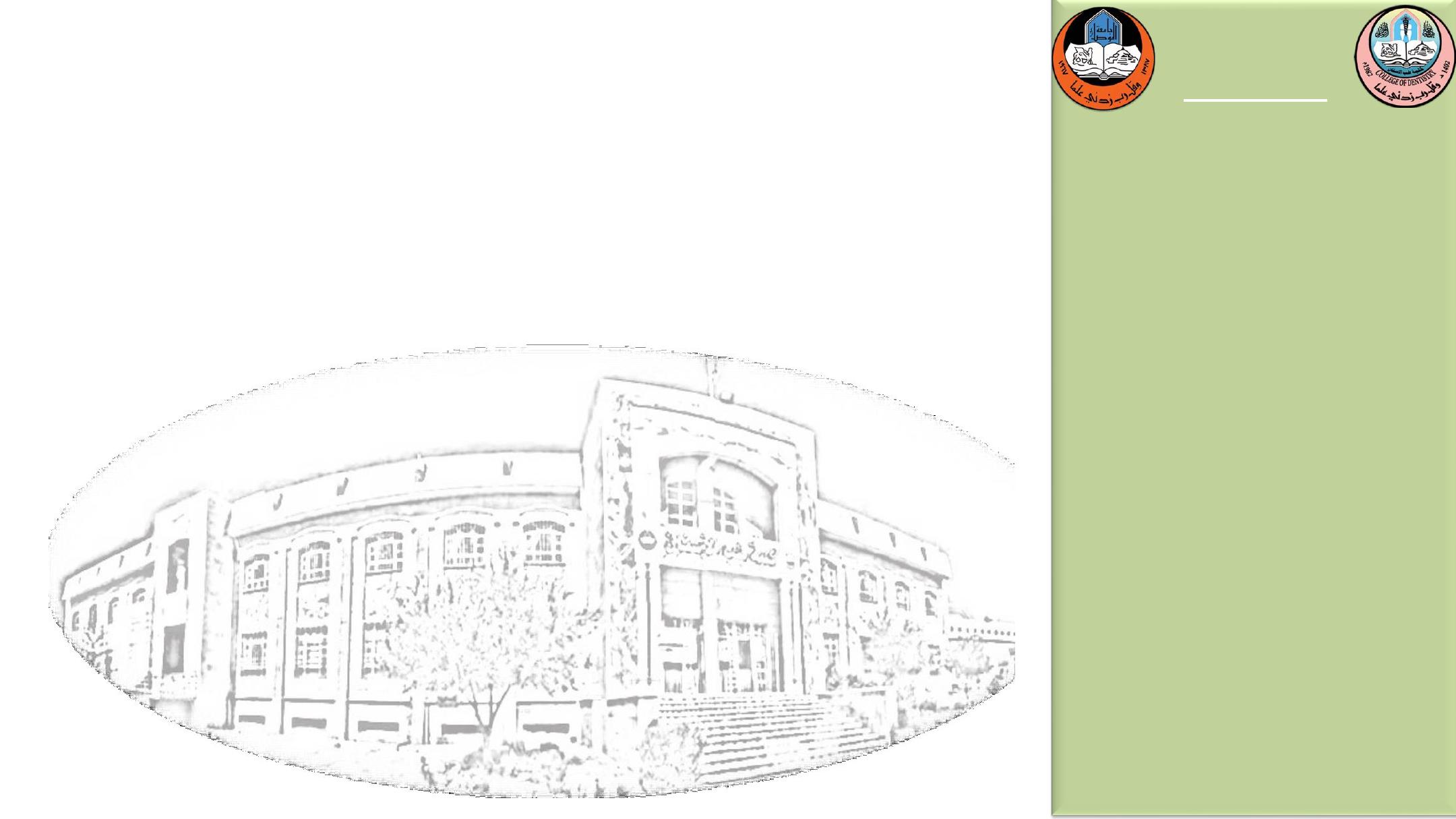
POST OPERATIVE
EXTRACTION
COMPLICATION
U N IV ERS ITY O F M O S UL
C O L L EGE O F D E NTIS TRY
5 t h c lass
By:
Hind Taher
2020-2021
P.O.P
Department
Department of:
HERE
Pedodontics

U N I VE R S I T Y O F M O S U L
C O L L E GE O F D E N T I S T R Y
020-2021
POST OPERATIVE EXTRACTION COMPLICATION
Common risks and complications include
:
1.damage to lips and cheeks: you may bite or rub the numbed area without realising the damage you may
be causing; children may need to be supervised until the numbness has worn of
2.short term minimal to moderate pain, including jaw pain due to the irritation of the tissues and the
movement of the jaw during the extraction
3.short term swelling :apply an ice pack to facial area near the extraction.continue using the ice in 15
minute . After 36 HOURES, ice will no longer be benfit in reducing swelling and instead by warm damp
cloth.

U N I VE R S I T Y O F M O S U L
C O L L E GE O F D E N T I S T R Y
020-2021
POST OPERATIVE EXTRACTION COMPLICATION
Common risks and complications include
:
4.Temporary numbness : the numb feeling will typically wear off within 1 to 6 hours after extraction . the
risk of numbness is accidentally child biting and hurting their lip,check,tongue after dental work
5.Bleeding: the bleeding after tooth extraction is entirely normal .a pinkish tinted saliva and subtle oozing
is fairly common during the first hours after extraction,if bleeding getsssive ,control it by using dampened
gauze pads and biting down to keep pressue on al also we can use moistened tea bag , as the tannic acid
helps blood vessels contract and apply pressure to gauze or tea bag by gently biting down for 30
3.short term swelling :apply an ice pack to facial area near the extraction. continue using the ice in 15
minute . After 36 HOURES, ice will no longer be benfit in reducing swelling and instead by warm damp
cloth.

U N I VE R S I T Y O F M O S U L
C O L L E GE O F D E N T I S T R Y
020-2021
POST OPERATIVE EXTRACTION COMPLICATION
Common risks and complications include
:
6. dry socket: occurs when a blood clot does not form in the hole where the tooth was or the blood clot
is disrupted:– the bone underneath will be exposed to air and food– this can be very painful and can
cause a bad taste and/or odor in your/your child’s mouth, and this condition very rare in Children.
7. Trismus (difficulty opening and closing mouth) - Occasionally patients chewing muscles and jaw
joints remain sore 3-5 days after permanent tooth extraction. This soreness can also make it difficult to
open and close your mouth. Soreness should eventually subside.

U N I VE R S I T Y O F M O S U L
C O L L E GE O F D E N T I S T R Y
020-2021
POST OPERATIVE EXTRACTION COMPLICATION
Trismus is more commonly temporary than permanent. But the earlier you start
treatment, the better the chance for a greater recovery. Some treatment options
include:Use of a jaw-stretching device. These devices fit between the upper and
lower jaw. A physical therapist will tell you which stretches to perform and how
often. Studies indicate the devices may help increase the mouth opening by 5 to 10
mm Trusted Source.
Medication. Your doctor may recommend or prescribe a muscle relaxant, pain
reliever, or anti-inflammatory medication
Physical therapy that involves massaging and jaw stretching.
A change to a predominately soft-food diet until symptoms
+improve

U N I VE R S I T Y O F M O S U L
C O L L E GE O F D E N T I S T R Y
020-2021
POST OPERATIVE EXTRACTION COMPLICATION
Common risks and complications include
:
8.infaction: is the most common complication after tooth extraction. Our mouth is full of bacteria.
Dentists decide whether to give antibiotics after the tooth extraction or not. Normally, for simple tooth
extractions, antibiotics are not required, but if a patient has pain and swelling, even or pus, then it is
better to go for preventive antibiotics

U N I VE R S I T Y O F M O S U L
C O L L E GE O F D E N T I S T R Y
020-2021
POST OPERATIVE EXTRACTION COMPLICATION
Uncommon risks and complications include:
1.loss of space for adult tooth: if a baby tooth is lost early, the adult tooth may not be ready to move into
position to fill the space; this can result in a loss of space for the adult tooth
2.prolonged or permanent nerve damage: a small percentage of people may, in spite of all precautions,
experience partial or total loss of feeling in the area served by the nerves close to the extraction site;
irritation tothese nerves during the extraction can cause permanent or prolonged numbness or a tingling
sensation to the lip, tongue, cheek, chin, gums, or teeth
3. bone and root fragments remain in the gum.

U N I VE R S I T Y O F M O S U L
C O L L E GE O F D E N T I S T R Y
020-2021
What can dentist instructions parent’s child do to help prevent complications
following removal of a tooth?
Children need adult supervision immediately after an extraction of a baby tooth. You can help
your child/yourself to prevent complications such as pain, swelling, infection and bleeding by
following a few simple points: • The blood clot that seals the wound where the tooth was
taken out is essential to the healing process. It prevents infection, helps new tissues form and
stops the wound from re-opening. To avoid removing the blood clot and/or decrease the risk
of bleeding:– Do not rinse the mouth for the first 24 hours after the tooth extraction.– Avoid
excessive activity for the day (e.g. limit running, jumping, swimming).– Keep your/your child’s
head elevated and do not lie flat. •

U N I VE R S I T Y O F M O S U L
C O L L E GE O F D E N T I S T R Y
020-2021
To avoid injury and/or infection:– You/Your child must not bite or suck the lip, cheek or tongue
while the area is numb.– Watch carefully that younger children do not chew or suck a numb
lip, cheek or tongue.– Do not place fingers, pencils or other objects in the mouth. • Follow
these tips when eating:– Avoid eating until the numbness is gone.– Chew food on the opposite
side of the mouth to the wound for 24 hours.– Avoid eating hard or sharp foods such as potato
chips or crackers for a few days after the tooth removal. Hard or sharp foods might dig into the
hole where the baby tooth was.– Eat soft, nutritious foods such as soft boiled eggs, finely
chopped meat or cheese, custards, milk, soup or fruit juice.– After the first 24 hours, ensure
your/their mouth is rinsed gently after meals. Half a teaspoon of table salt in a glass of
lukewarm water is an effective mouth rinse

U N I VE R S I T Y O F M O S U L
C O L L E GE O F D E N T I S T R Y
020-2021

U N I VE R SI T Y O F M O SU L
C O L L E GE O F D E N T I S T R Y
THE END
2020-2021
